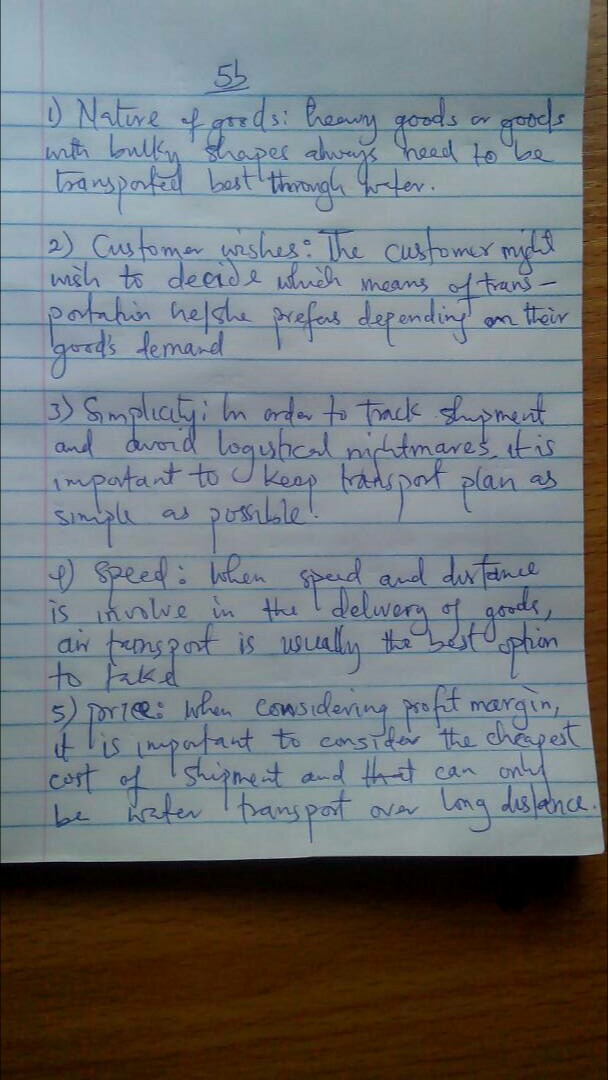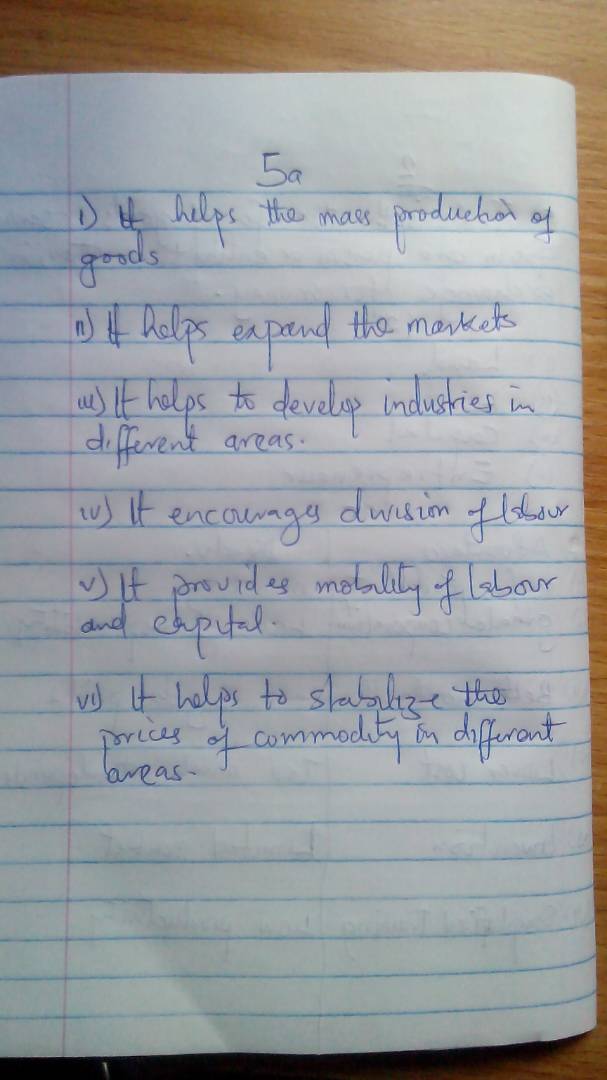WWW.SOLUTIONFANS.COM - MASTER OF ALL EXAM RUNS
Commerce OBJ:
1acaeeadede
11edcdeeeacc
21decdbdcaee
31beeebbcaac
41adaeeeacee
51eeaacccddb
COMPLETED
Commerce Theory
5a)
i)Transportation helps much to the development of different industries, which produce perishable goods, such as fisheries, poultry firms, horticulture, dairy etc
ii)Transportation helps in mass production. Whether
iii)Transportation helps in mass production
iv)Without development of transportation neither mass production nor distribution is possible
v)Transportation has contributed much to the development of economic, social, political and cultural fields and uplifting their condition.
5b)
Or
5b)
i)Accessibility: This primarily deals with the ease of getting/boarding a vehicle. If a mode is not easily accessible then it loses its usefulness because of its unavailability in a certain condition.
ii)Cost/fare of ticket or cost of
service: Considering large number of trips taking place for different purposes and a modern capitalist economy, cost becomes one of the single most important determining factor. It can also be linked to affordability of the user.
iii)Fuel efficiency/carbon emission:
With the growing environmental concerns many people and companies prefer to chose a option with smaller carbon footprint.
iv)Speed: This factor is another most
important and deterministic factor depending upon the situation.
Fastest mode may seem to be best option but cost associated with it makes it less lucrative, a cheap mode might result in delay and the purpose of whole trip may be defeated.
v)Capacity/Carrying Capacity: This
is another important factor especially for logistic companies, it becomes important in case of travelling in a group.
7)
i)Separate Legal Existence: any group of people can operate a business together in an unincorporated partnership, they remain a collection of individuals who own property and incur debt. In other words it can buy and sell property, hire employees, institute lawsuits and retain attorneys to defend claims against it.
ii) Limited Liability: This feature allows members the freedom to hire employees and conduct high-liability business that would otherwise put the members’ personal assets at risk in a lawsuit.
iii)Insolvency Clawbacks: provisions relating exclusively to LLPs allow for a clawback of any “withdrawals” (including drawings, loan repayments and property distributions) by a Member during the two years prior to an LLP becoming insolvent.
iv)Negligence: if a Member is negligent and a third party suffers loss as a result then the third party could try to take action against that individual Member as well as the LLC
v)Personal Guarantees: anyone lending money to an LLP may still require personal guarantees from the Members, as they frequently do with directors/shareholders of a company.
3)
i)LACK OF INSUFFICIENT CAPITAL- Many West African countries lacks sufficient capitals to cope with the expanding growth of business and the level of capital invested in the business is usually low.
ii)UNDEVELOPED MARKETS – Markets in West Africa are not well developed toaccommodate large scale commercial
activities.
iii)ILLITERACY – The high rate rate of illiteracy in West Africa usually affects
the growth of commerce in the region.
Many people cannot read or write and
cannot interacts with foreign traders in
business.
iv)POOR TRANSPORT SYSTEM – Major roads in some part of Africa and other
West Africa are bad which discourages
transportation of goods and services
v)LOW PER CAPITAL INCOME – Majority of people living in Africa and some part
of West Africa lives below poverty line
and may discourage people from
buying and selling.
2a)
Trade is the transfer of goods or services from one person or entity to another in exchange for money
2b)
FACTORS OF PRODUCTION
i)land
ii)labour
iii)capital
iv)entrepreneur
2c)
Advantages:
i)higher productivity
ii)greater cooperation
iii)better goodwill
iv)lower cost
v)invention
vi)simplified training
Disadvantages:
i)monotony
ii)lack of responsibility
iii)lack of job pride
iv)too much interdependence
v)limited market
vi)low productivity
9a)
A contract is an agreement with specific terms between two or more persons or entities in which there is a promise to do something in return for a valuable benefit known as consideration.
9b)
i)Express Contracts: In an express contract, the parties state the terms, either orally or in writing, at the time of its formation. There is a definite written or oral offer that is accepted by the offeree (i.e. the person to whom the offer is made) in a manner that explicitly demonstrates consent to its terms.
ii)Implied Contracts: Although contracts that are implied in fact and contracts implied in law are both called implied contracts, a true implied contract consists of obligations arising from a mutual agreement and intent to promise, which have not been expressed in words.
iii)Executed and Executory Contracts: An executed contract is one in which nothing remains to be done by either party. The phrase is, to a certain extent, a misnomer because the completion of performances by the parties signifies that a contract no longer exists.
iv)Bilateral and Unilateral Contracts: The exchange of mutual, reciprocal promises between entities that entails the performance of an act, or forbearance from the performance of an act, with respect to each party, is a Bilateral Contract
COMPLETED
436 total views, 1 views today
also don't forget to leave a Reply, we would very MUCH appreciate Your Comments On This Post Below. Thanks!



